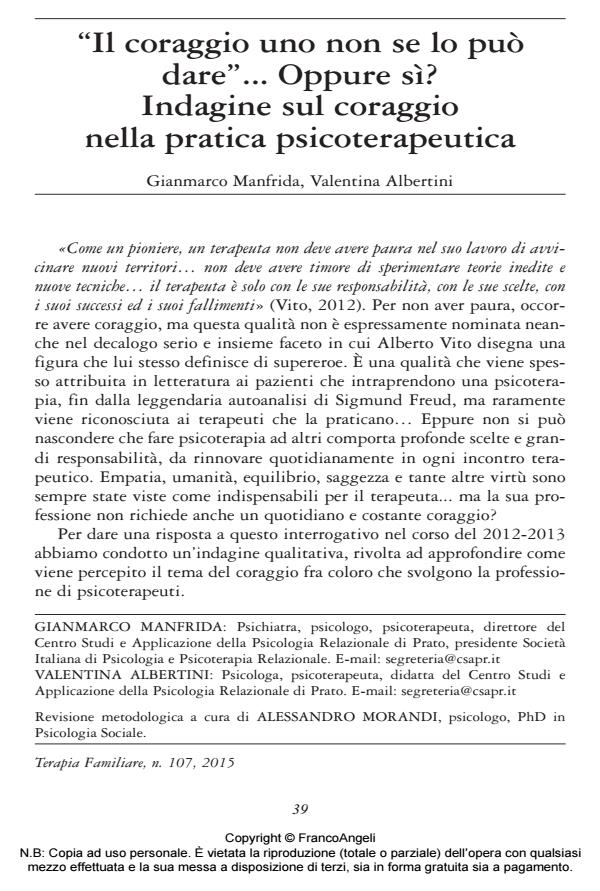"Il coraggio uno non se lo può dare".. Oppure sì? Indagine sul coraggio nella pratica psicoterapeutica
Journal title TERAPIA FAMILIARE
Author/s Gianmarco Manfrida, Valentina Albertini
Publishing Year 2015 Issue 2015/107 Language Italian
Pages 19 P. 39-57 File size 199 KB
DOI 10.3280/TF2015-107003
DOI is like a bar code for intellectual property: to have more infomation
click here
Below, you can see the article first page
If you want to buy this article in PDF format, you can do it, following the instructions to buy download credits

FrancoAngeli is member of Publishers International Linking Association, Inc (PILA), a not-for-profit association which run the CrossRef service enabling links to and from online scholarly content.
The authors present the results of a survey on the subject of courage in the practice of psychotherapy. Courage is a quality often required to patients undergoing psychotherapy, but more rarely attributed to therapists. After an introduction on the concept of "courage", considered in itsòplè+ triple meaning of "masculine warrior quality", of "solidarity" and of "moral responsibility", a qualitative analysis of 105 questionnaires on the theme of courage in psychotherapy is brought on and discussed in detail. The aim of the survey is to open a thinking process on the theme of courage as a tool present (or absent) in the "toolbox" of the therapist, but also to understand what is the meaning of "courage" for psychotherapists and reflect on aspects of the profession that may require to be brave.
Keywords: Courage, psichoterapists, questionnaire, courage in psychotherapeutic practice, psychotherapeutic skills, qualitative survey.
- Ariano G. (1997). La psicoterapia d’integrazione strutturale. Roma: Armando.
- Brown R. (2000). Group Precesses. Dynamics within and between groups. Oxford: Basil Blackwell (trad. it.: Psicologia sociale dei gruppi. Bologna: Il Mulino).
- Bruni F., Vinci G., Vittori M.L. (2010). Lo sguardo riflesso. Psicoterapia e formazione. Roma: Armando.
- Dinkmeyer D., Dreikus R. (1963). Encouraging Children to Learn: The Encouragement Process. Upper Saddle River: Prentice-Hall (trad. it.: Il processo di incoraggiamento. Firenze: Giunti-Barbera).
- Fusaro D. (2012). Coraggio. Milano: Raffaello Cortina.
- Giusti E., Harman R. (a cura di) (1996). La psicoterapia della gestalt. Intervistando i maestri. Roma: Sovera.
- Kant I. (1784) Beantwortnung der Frage: Was ist Aufklarung. Berliner Monatsschrift, dicembre 1784 (trad. it.: Saggio su che cos’è l’illuminismo. In: Kant I., Che cos’è l’illuminismo. Roma: Editori Riuniti, 1991). Kant I. (1797). Metafisica dei Costumi (trad. it. a cura di Vidari C., Metafisica dei Costumi. Roma-Bari: Laterza, 1970).
- Katzanzakis N. (1961). El Greco e lo sguardo cretese (trad. it. di Bonavia G., Roma: Biblioteca del Vascello, 1994).
- Imbasciati A. (2007). Gli equivoci sulle psicoterapie. In: Molinari E., Labella A. (a cura di), Psicologia clinica. Dialoghi e confronti. Milano: Springer Verlag.
- Langelotti V. (2009). La Grande Madre rinnegata, Ipnosi ed EMDR. In: Valerio C.,
- Mammini C. (a cura di), L’evoluzione clinica dell’ipnosi. Milano: FrancoAngeli.
- Manfrida G. (1998). La narrazione psicoterapeutica. Invenzione, persuasione e tecniche retoriche in terapia relazionale. Milano: FrancoAngeli.
- Manfrida G. (2009). L’Artusi, la nouvelle cuisine e la psicoterapia: conservazione, innovazione e mode in terapia relazionale. Ecologia della Mente, 1, 09: 1-9. DOI: 10.1712/512.611
- Nietzsche F.W. (1878). trad. it.: Giarnetta S., Umano, troppo umano. Milano: Adelphi, 1979.
- Nietzsche F.W. (1885). trad. it.: Montinari M., Così parlò Zarathustra. Milano: Adelphi, 1976.
- Pani R., Boeris E. (1999). La questione dell’onorario in psicoterapia psicoanalitica. Roma: Piccin.
- Pietropolli Charmet G., Assante C., Bufano M., Malacrida M. (a cura di) (2012). La vocazione psicoterapeutica. Come si diventa psicoterapeuti dell’adolescenza. Milano: FrancoAngeli.
- Tillich P. (1952). The Courage to Be. Glasgow: William Collins (trad. it.: Il coraggio di esistere. Roma: Astrolabio-Ubaldini, 1968).
- Trevi M., Federigo A. (2008). Dialogo sull’arte del dialogo. Milano: Feltrinelli.
- Vito A. (2012). Affetti Speciali. Uno psicologo (si) racconta. Francavilla al Mare: Ed. Psiconline.
- Clinical Interventions in Systemic Couple and Family Therapy Gianmarco Manfrida, Valentina Albertini, Erica Eisenberg, pp.119 (ISBN:978-3-319-78520-2)
- Vi presento il mio terapeuta! La persona del terapeuta descritta dai suoi pazienti Claudio Fratesi, Elisa Zamagni, in TERAPIA FAMILIARE 122/2020 pp.45
DOI: 10.3280/TF2020-122004
Gianmarco Manfrida, Valentina Albertini, "Il coraggio uno non se lo può dare".. Oppure sì? Indagine sul coraggio nella pratica psicoterapeutica in "TERAPIA FAMILIARE" 107/2015, pp 39-57, DOI: 10.3280/TF2015-107003